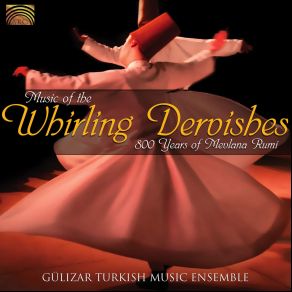Music of the Whirling Dervishes - 800 Years of Mevlana Rumi
Download links and information about Music of the Whirling Dervishes - 800 Years of Mevlana Rumi by Gulizar Turkish Music Ensemble. This album was released in 2007 and it belongs to World Music genres. It contains 5 tracks with total duration of 01:11:14 minutes.

|
|
|---|---|
| Artist: | Gulizar Turkish Music Ensemble |
| Release date: | 2007 |
| Genre: | World Music |
| Tracks: | 5 |
| Duration: | 01:11:14 |
| Buy it NOW at: | |
| Buy on iTunes $9.99 | |
Tracks
[Edit]| No. | Title | Length |
|---|---|---|
| 1. | Naat-i Sherif / Peshrev in Bayati / Mevlevi Ayin in Maqam Bayati | 53:26 |
| 2. | Taqsim in Maqam Segah / Niyaz Ilahisi | 6:10 |
| 3. | Peshrev in Maqam Ajem | 2:40 |
| 4. | Taqsim in Maqam Saba / Ilahi in Maqam Saba | 4:49 |
| 5. | Taqsim in Maqam Hijaz / Ilahi in Maqam Hijaz | 4:09 |
Details
[Edit]Somewhat longer than many contemporary recordings of Mevlevi music (the hypnotic neys tend to drone on longer than a lot of attention spans do), this album from the Gulizar Turkish Music Ensemble plays a full ayin ceremony, following all of the necessary rules for a proper Mevlevi event. The album opens with this tour de force, plodding through the ecstatic and hypnotic music that accompanies the famous whirling dervishes, beginning with lyrics by Rumi himself, followed by a proper ceremony in maqam bayati (the oldest ayin with a known composer, for that matter, and lyrics from Rumi's master, Shams-I Tabrizi). The flutes are precise, the drums thump properly, and the recitation is spot-on. The music of the Mevlevi however is known for qualities other than sheer excitement. Following this primary piece of music, the album collects a small series of taqsims in various maqam (modes). Many of the bits and pieces played here, in keeping with the proper traditional line, were originally penned either by Rumi and his master, or by Sultan Veled, another important figure in Sufism (and Rumi's son). Again, the ney can become rather lengthy and hypnotic, but these are shorter spells of the droning. Excitingly enough, there's also more exploration of the mode (which, of course, is the goal of a taqsim in general), with fairly good results. Not the most exciting, or necessarily the best album of Mevlevi music out there, but this one isn't bad as a general starting point for the curious newcomer.